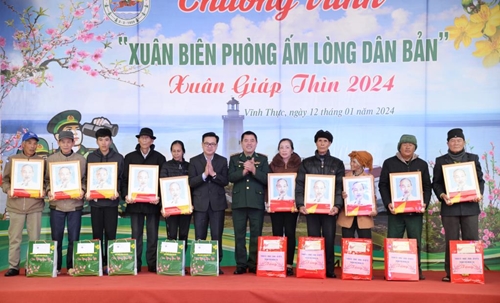The force has also promoted the role of ethnic minority people in safeguarding the national sovereignty and border security, thereby enhancing the people’s trust to the Party, State, military, border guards, and authorities at all levels, and bolstering the national great unity.
Building the firm border area
Border areas are mainly inhabited by ethnic minority people. They hold an important role in protecting the national independence, sovereignty, unity, stability, peace and development of the country in all historical periods. In addition to making policies, the Party and State paid a special attention to building policies for ethnic minority and mountainous people, affirming that ethnic work and national unity play an important strategic position in the Vietnamese revolutionary cause.
    |
 |
|
Offering gifts to poor and near-poor households |
Stationed in border areas, over the past years, the Vietnam Border Guard Force has worked with the Council for Ethnic Affairs of the National Assembly (N.A.) to build, review and examine law projects; develop and verify policies for ethnic minority and mountainous areas, policies on protecting the national sovereignty and national border security; mobilize and instruct ethnic minority people to develop economy and participate in protecting the national sovereignty and border security.
Both sides coordinated to effectively implement Party and State’s guidelines and policies on ethnic issues. The N.A. Council for Ethnic Affairs is responsible for inspecting and observing all levels, sectors and localities in carrying out ethnic affairs. Meanwhile, the Vietnam Border Guard Command has directed affiliated units stationed in provinces and cities to work with local authorities to conduct all directives and policies for ethnic minority groups in border areas, regularly carry out dissemination work to mobilize them to follow all guidelines and policies of the Party and the State’s laws. It also sent troops to localities to assist them in building the political system at the grassroots levels, while carrying out programs to take care of the ethnic minorities’ life via practical activities, such as the “Border spring warms up border people’s heart” program on the occasion of the lunar New Year,” and the “Paving the way to school for children - Adopted children of border posts” program, to name but a few.
Nurturing children for brighter future
In 1992, the Ministry of Training and Education and the Vietnam Border Guard Command signed a coordination program No.4641/CTPH, issued on July 30, 1992 on “Universalization of primary education and combating illiteracy” in border areas and islands, contributing to gradually enhancing the comprehensively-strong border area.
In 2011, both sides signed program No.920/CTr-BGDDT-BTLBP on September 5 to work together to boost anti-illiteracy work, boost primary education program and develop community learning centers in border areas and islands (2011-2015 period), aiming to eradicate illiteracy and reduce the number of dropouts in border areas and islands.
    |
 |
|
A border officer teaches an adopted children. |
In 2018, the two sides continued working together via program 633/CTr-BGDDT-BTLBP, signed on March 2, to boost the building of learning society in border areas and on islands in the 2018-2025 period. Accordingly, the Vietnam Border Guard Command directed affiliated units to work with the education sector of localities to organize activities to support education work, such as opening literacy classes, offering school supplies to needy students, mobilizing students to go to school, to name but a few. Over the past time, border units and the education sector of provinces have maintained over 30 literacy classes with over 700 ethnic minority students in border, sea, and island areas; mobilized more than 6,000 dropouts to return to school...
Besides, the Vietnam Border Guard Command implemented many programs to support poor students to keep up with their study, such as the “Paving the way to school for children - Adopted children of border posts” program, among others.
Developing socio-economy in ethnic minority and mountainous areas
In order to carry out the government’s ethnic policies in border and island areas, the government’s Committee for Ethnic Affairs and the Vietnam Border Guard Command have signed cooperation agreements and achieved many positive outcomes, highly appreciated by the Party, State, and people.
These cooperation programs have also contributed to socio-economic development, improving the people’s life, and encouraging ethnic minority groups to join hands in protecting the national sovereignty and security in border areas, and over sea and islands.
Reportedly, from 2016 to 2021, both sides worked together to disseminate information to over 8.4 million people to follow the Party’s guidelines and policies and the State’s laws.
In addition, border units also sent many border guard officers to join hands with local authorities to support local people.
Implementing the Party and State’s guidelines and policies on socio-economic development in mountainous and island areas, both sides have effectively implemented many programs and projects in the areas, such as the national target program for hunger eradication and poverty reduction.
Translated by Minh Anh
Source: Baobienphong